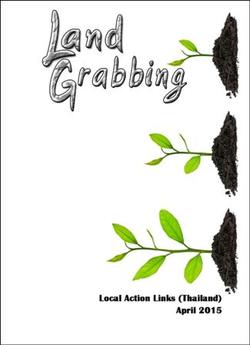Local Action Links | October 2015
Land grabbing and impacts to small-scale farmers in Southeast Asia sub-region
One of the biggest problems in the Southeast Asia Sub-Region countries, namely Thailand, Myanmar, Laos and Cambodia is land grabbing. For the purposes of this paper, land grabbing is defined as a large-scale acquisition (normally 200 hectares or more) by a corporate investors or government entities through buying, leasing or accessing land in order to produce food or non-food crops or to use this land for extractive purposes, such as hydropower dams and logging. They make these acquisitions for the purpose of increasing supply of goods for domestic and foreign markets or making a favorable return on an investment. The FAO’s definition of land grabbing adds that these acquisitions undermine food security in the host countries.
Land grabbing and impacts to small-scale farmers in Southeast Asia sub-region
One of the biggest problems in the Southeast Asia Sub-Region countries, namely Thailand, Myanmar, Laos and Cambodia is land grabbing. For the purposes of this paper, land grabbing is defined as a large-scale acquisition (normally 200 hectares or more) by a corporate investors or government entities through buying, leasing or accessing land in order to produce food or non-food crops or to use this land for extractive purposes, such as hydropower dams and logging. They make these acquisitions for the purpose of increasing supply of goods for domestic and foreign markets or making a favorable return on an investment. The FAO’s definition of land grabbing adds that these acquisitions undermine food security in the host countries.
Land grab have caused a number of people in these four countries to become landless.This is because they do not have legal security over the land they live on, some of them living on state-owned land.Others have been being evicted after the state or companies with backing from the state have seized their land. As land-grabbing has become bigger in scale and more systematised in recent years,the number of
people who have been evicted has skyrocketed. Millions of hectares of land have been grabbed and handed over to either foreign or domestic investors. By altering land laws to favour the interests of investors, national governments have accelerated land-grabbing. At the same time, codes of conduct have mostly been ignored or breached by foreign investors. They have rarely safeguarded the interests of those who have been evicted as a result of these projects and make sure that they are no worse off. Sometimes, their actions have broken laws in both their own countries and the host countries.
Land grabbing disproportionately affects the poor. They are usually the first group to lose their land, often due to distress sales, particularly if they do not possess formal property rights. Large-scale land titling programmes has rarely benefitted them and having customary rights does not protect them much from the law. New sources of livelihood are not easily available because it is normally too expensive for the poor to buy new land in other locations and they often lack the skills needed to work in other sectors.
Land grabbing has become a severe opportunity cost in these countries because these investments in land crowd out investments in other sectors, such as mass manufacturing and services, which could potentially create good jobs and nurture the growth of a middle-class. Further, land grabbing is happening at a time when many developing countries are experiencing considerable growth in mass manufacturing, receiving significant foreign direct investment (FDI) in this sector.
Land-grabbing therefore degrades the governments who have sold and leased the land because they have unscrupulously given higher priority to short-term profits and their own wealth over the needs of their citizens. It also degrades the meaning of citizenship because it evicts communities who have been living in these areas for centuries without them having a say in this process. Further, it degrades the environment, often poisoning the land, water, and air in these areas. Consequently, land grabbing is egregiously damaging these countries in many ways.
In this section, the report gives a general overview of land grabbing in these countries. First, it discusses land-grabbing in the neoliberal context, detailing how neo-liberalism has contributed to it. Second, it details these linkages between global economic activities and land dispossession in these countries. Last it describes the similarities between these countries, including the role of state and non-state actors and institutional arrangements facilitating land grabbing.














